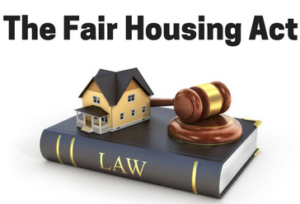This April marks the 50th anniversary since the Fair Housing Act was signed into law by Lyndon B. Johnson on April 11, 1968. The Fair Housing Act was historic legislation that expanded on previous laws by prohibiting housing discrimination based on race, religion, national origin, and (as amended) disability and family status. The goal of the FHA is to make sure all tenants and prospective tenants are treated fairly but can often present challenges to landlords and property owners. In this article, we will discuss some tips to prevent FHA claims against you or your property.
Simply put, the best way to avoid fair housing complaints is to treat every tenant and prospective tenant the same. If you’re enforcing house rules against one tenant but not another, this is grounds for a fair housing complaint. What you do for one tenant you have to do for all. Policies provided in the lease agreement and community addenda must be applied equally to each tenant.
Fair housing claims are often brought from the application and screening process. Section 92.3515 of the Texas Property Code requires landlords to provide a printed notice of eligibility requirements to a prospective tenant with the rental application. This notice should state the landlord’s tenant selection criteria and the grounds for which the rental application may be denied, including the applicant’s criminal history, previous rental history, current income, credit history or failure to provide accurate or complete information on the application form. This notice should also come with an explanation of the application process and a statement that your process adheres to all applicable fair housing laws. Questions on the application should not ask about physical or mental disabilities. Landlords should strictly adhere to the written policy and keep good records of each applicant or inquiry.
One area to be carefully considered is an applicant’s criminal background. In 2016, HUD’s Office of General Counsel issued guidance concerning how the Fair Housing Act applies to the use of criminal history by landlords and real estate professionals. The guide addresses how the discriminatory effects in the criminal justice system are applicable in Fair Housing cases when a landlord denies or refuses to renew an applicant based on an individual’s criminal history. For example, African American and Hispanics are arrested, convicted and incarcerated at rates that are disproportionate to their share of the general population. Because of this, the denial of a rental application based on the applicant’s criminal background could have a disproportionate impact on minority rental applicants.
Thus, while having a criminal record is not a protected characteristic by itself, under the Fair Housing Act you could still be liable for discrimination if your denial of a prospective tenant, based on their criminal history, impacts one race or national origin more so than another. Accordingly, a Fair Housing Act violation can occur even when there was no intention of the landlord to discriminate.
To better avoid liability, a landlord should limit denials based on a prospective tenant’s criminal background to convictions (not arrests) of violent crimes, drug dealing, and sexual assault. Whether to deny an applicant for lesser crimes should allow consideration for the severity of the offense, the number of years since the crime occurred, the age of the applicant at the time of the conviction, etc. And of course, be sure to apply the same standard equally to all applicants.
Another way to help prevent any fair housing complaints from arising is to be aware of how you are marketing your property. This means that your marketing strategy should be inclusive of everyone and focused on the property’s attributes and amenities and not what type of residents you are seeking. If your property is full of families with children, you should avoid slogans such as “great for families” as it might be discriminatory against single persons. This issue might also arise while giving a tour of the property to a prospective tenant. Often times an applicant will ask “What kind of people live here” or “How many families live here?” these questions can lead to fair housing discrimination claims and should only be met with answers that state the property is inclusive of everyone who meets its rental criteria which is provided at the time the application is request.
Even though you have implemented all of the above suggestions and have tried your best to make sure all tenants and prospective tenants are treated alike and in a fair manner, it is still possible that someone will file a fair housing complaint against you. As soon as you receive any notice of a fair housing complaint we strongly suggest that you contact an attorney. Fair housing claims can come with some serious allegations and result in unwanted consequences for the property, so it is essential that you protect your property and its employees by being aware of the Fair Housing Act.
Please note that this article is meant to inform; it neither constitutes legal advice, nor does it create an attorney-client relationship. We recommend you contact an attorney familiar with the Texas Property Code and Texas Occupations Code for your particular needs.
The post Tips to Avoid Fair Housing Act Violations appeared first on Huhem Law Firm.




